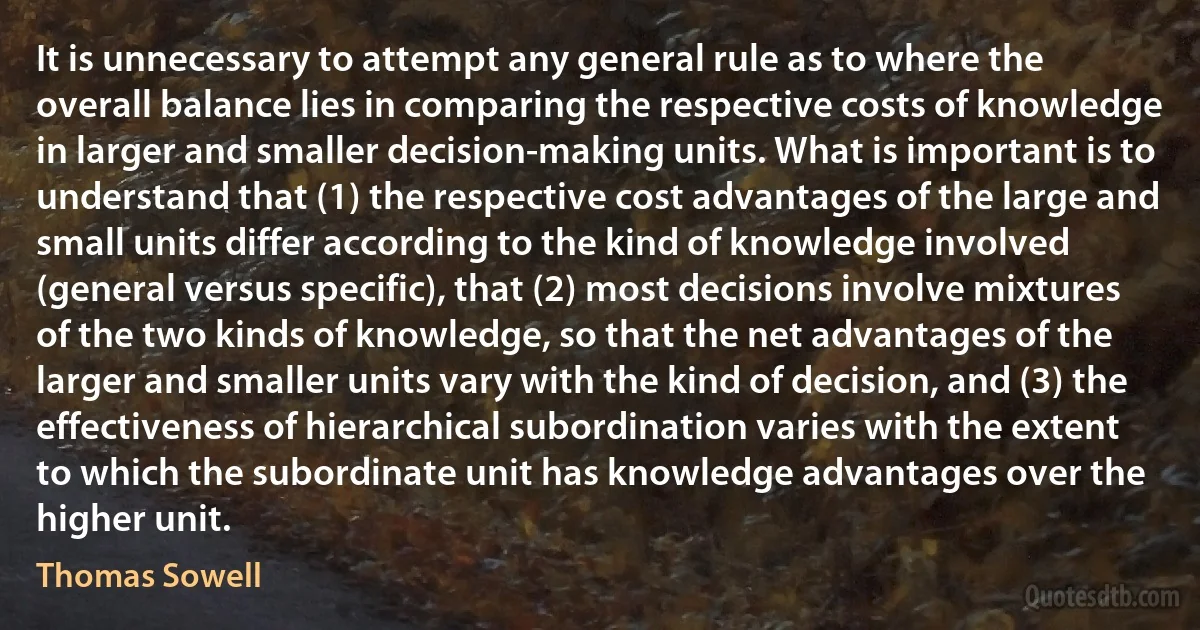
It is unnecessary to attempt any general rule as to where the overall balance lies in comparing the respective costs of knowledge in larger and smaller decision-making units. What is important is to understand that (1) the respective cost advantages of the large and small units differ according to the kind of knowledge involved (general versus specific), that (2) most decisions involve mixtures of the two kinds of knowledge, so that the net advantages of the larger and smaller units vary with the kind of decision, and (3) the effectiveness of hierarchical subordination varies with the extent to which the subordinate unit has knowledge advantages over the higher unit.
Thomas SowellRelated topics
attempt cost effectiveness general kind knowledge large net overall rule small specific subordinate subordination unit higher lies decision-making costsRelated quotes
The advantage of the Referendum is this-that the issue is quite clear and quite precise. It is not one of the mixed issues inevitably put before the constituencies at a General Election. It is perfectly easy to say, when the Referendum is over, on what the Referendum was, whereas after a General Election every man says that it was upon the subject in which he is interested, if the election has gone in his favour. The Referendum has an enormous advantage. It does not involve a General Election; it does not involve all the personal bitterness inevitably involved in a contest between the two competitors for a seat; it does not carry with it a change of Government; and it does get a clear verdict from the people.

Arthur Balfour
The second conception of the world via the medium of matter required both a visual and a tactile perception of things. In this case the whole design process tends to emanate from the specific characteristics of the respective medium used. The leader of this movement (Tatlin) assumed.... that the intuitive and artistic mastery of materials would lead to inventions on the basis of which objects could be constructed. He believed he could prove this theory with his design for the 'Monument to the Third International' (1920), [never built]. He accomplished this task without having any special technical knowledge of construction.

El Lissitsky
Our country is suffering from the lack of food. We don't have rice for the military. Our country is in a state of anarchy because of the dysfunctional food rationing system. The administration department is responsible for this mess, as well as the Party officials. The Party's Central Committee members have failed their duty in generating a revolutionary spirit, diminishing the Party's effectiveness. We must solve the food problem according to socialist principles, and we must not rely on individuals. If we let the people solve the problem on their own, only merchants and markets will prosper. Then, selfishness will rule our society and destroy our system of true equality.

Kim Jong-il
Modern scientists attempt excursions to other planets, but they have no information of how many different types of oceans and seas there are within the universe. According to their experience, the Moon is full of dust, but this does not explain how it gives us soothing rays from a distance of millions of miles. As far as we are concerned, we follow the authority of Vyasadeva and Sukadeva Gosvami, who have described the universal situation according to the Vedic literature. These authorities differ from modern scientists who conclude from their imperfect sensual experience that only this planet is inhabited by living beings whereas the other planets are all vacant or full of dust.

A. C. Bhaktivedanta Swami Prabhupada
Man is, at one and the same time, a solitary being and a social being. As a solitary being, he attempts to protect his own existence and that of those who are closest to him, to satisfy his personal desires, and to develop his innate abilities. As a social being, he seeks to gain the recognition and affection of his fellow human beings, to share in their pleasures, to comfort them in their sorrows, and to improve their conditions of life. Only the existence of these varied, frequently conflicting, strivings accounts for the special character of a man, and their specific combination determines the extent to which an individual can achieve an inner equilibrium and can contribute to the well-being of society.

Albert Einstein
